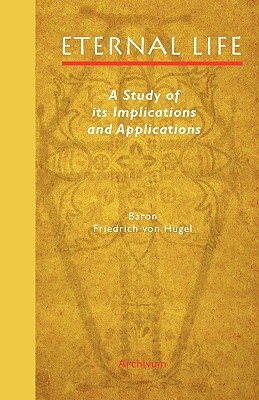
- We will send in 10–14 business days.
- Author: Friedrich Von Hügel
- Publisher: Archivum Press
- ISBN-10: 1597314048
- ISBN-13: 9781597314046
- Format: 14 x 21.6 x 3 cm, minkšti viršeliai
- Language: English
- SAVE -10% with code: EXTRA
Reviews
Description
Baron Friedrich von Hügel (5 May 1852-27 January 1925) was a Roman Catholic lay philosopher and writer. He never held an academic post nor did he ever earn a university degree. However, he is often mentioned alongside John Henry Newman as one of the most influential Catholic thinkers of his day. The scope of his learning was impressive and the list of his correspondents reads like a "who's who" of nineteenth- and early twentieth-century European religious leadership. When the University of Oxford granted him an honorary Doctor of Divinity degree in 1920, it was the first time since the Reformation that a Roman Catholic had been so honored by that university. Von Hügel was deeply engaged in theological discussions with major figures associated with the turn-of-the-century Modernist controversy. His scholarly concerns included the relationship of Christianity to history, ecumenism, mysticism, and the philosophy of religion. Baron von Hügel is chiefly remembered as a guide and encourager of souls, especially through the posthumous publication of many of his letters: Selected Letters, 1896-1924, Letters from Baron Friedrich von Hügel to a Niece, Spiritual Counsels, and Letters of Baron Friedrich von Hügel. In addition to extensive correspondence, his published works included The Mystical Element of Religion, a study of Catherine of Genoa, Essays and Address (in two volumes) and The Reality of God, and Religion and Agnosticism. This last book, The Reality of God, includes what was to be the Gifford Lectures of 1924-1925 and 1925-1926 at Edinburgh University.
EXTRA 10 % discount with code: EXTRA
The promotion ends in 21d.20:49:45
The discount code is valid when purchasing from 10 €. Discounts do not stack.
- Author: Friedrich Von Hügel
- Publisher: Archivum Press
- ISBN-10: 1597314048
- ISBN-13: 9781597314046
- Format: 14 x 21.6 x 3 cm, minkšti viršeliai
- Language: English English
Baron Friedrich von Hügel (5 May 1852-27 January 1925) was a Roman Catholic lay philosopher and writer. He never held an academic post nor did he ever earn a university degree. However, he is often mentioned alongside John Henry Newman as one of the most influential Catholic thinkers of his day. The scope of his learning was impressive and the list of his correspondents reads like a "who's who" of nineteenth- and early twentieth-century European religious leadership. When the University of Oxford granted him an honorary Doctor of Divinity degree in 1920, it was the first time since the Reformation that a Roman Catholic had been so honored by that university. Von Hügel was deeply engaged in theological discussions with major figures associated with the turn-of-the-century Modernist controversy. His scholarly concerns included the relationship of Christianity to history, ecumenism, mysticism, and the philosophy of religion. Baron von Hügel is chiefly remembered as a guide and encourager of souls, especially through the posthumous publication of many of his letters: Selected Letters, 1896-1924, Letters from Baron Friedrich von Hügel to a Niece, Spiritual Counsels, and Letters of Baron Friedrich von Hügel. In addition to extensive correspondence, his published works included The Mystical Element of Religion, a study of Catherine of Genoa, Essays and Address (in two volumes) and The Reality of God, and Religion and Agnosticism. This last book, The Reality of God, includes what was to be the Gifford Lectures of 1924-1925 and 1925-1926 at Edinburgh University.


Reviews